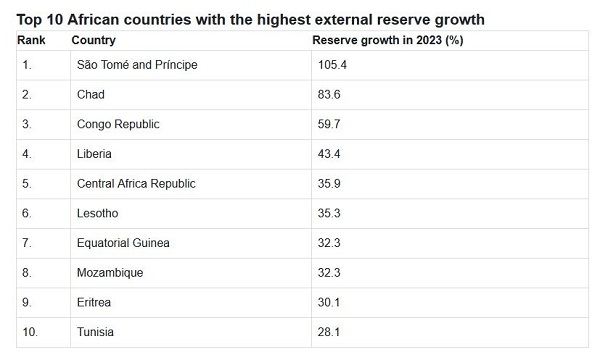Given that oil revenues account for over 36% of exports in Africa, commodity prices have a significant impact on how the currency rate, and external reserves function, profits for African nations.
Despite the adverse global economy and strong commodity prices, crude oil sales boosted export receipts and balance of payments, reversing Africa's declining reserves position in 2022.
Africa's foreign exchange assets increased by approximately 2.6 percent year on year to US$411.9 billion in 2023, after contracting by 2.3% year on year to US$401.3 billion in 2022. This is according to Afreximbank's African Trade Report 2024: Climate Implications of the AfCFTA Implementation that oil revenues account for over 36% of exports in Africa, commodity prices have a significant impact on how the currency rate, and external reserves function, profits for African nations.
Despite the adverse global economy and strong commodity prices, crude oil sales boosted export receipts and balance of payments, reversing Africa's declining reserves position in 2022.
Africa's foreign exchange assets increased by approximately 2.6 percent year on year to US$411.9 billion in 2023, after contracting by 2.3% year on year to US$401.3 billion in 2022. This is according to Afreximbank's African Trade Report 2024: Climate Implications of the AfCFTA Implementation.
The report also revealed that apart from commodity prices, sustained capital inflows have enhanced the continent's reserve position, owing to greenfield projects, backing from international and regional development financing organizations and bilateral partners, and increased tourist arrivals and remittances.
These positive developments helped improve (although little) the region's average import cover to 5 months in 2023, up from 4.7 months in 2022 and beyond the IMF requirement of 3 months.
A stable and growing external reserve can lead to increased investor confidence globally. Additionally, the external reserve plays a crucial role in maintaining global economic stability, amongst other major economic benefits.
The report also revealed that apart from commodity prices, sustained capital inflows have enhanced the continent's reserve position, owing to greenfield projects, backing from international and regional development financing organizations and bilateral partners, and increased tourist arrivals and remittances.
These positive developments helped improve (although little) the region's average import cover to 5 months in 2023, up from 4.7 months in 2022 and beyond the IMF requirement of 3 months.
A stable and growing external reserve can lead to increased investor confidence globally. Additionally, the external reserve plays a crucial role in maintaining global economic stability, amongst other major economic benefits.
With that said, here are the 10 African countries with the largest growth in their external reserves in 2023.
PS: This list shows the largest overall growth in external reserves within a one year span and not the countries with the highest overall external reserves.
Top 10 African countries with the highest external reserve growth

Business News of Monday, 2 September 2024
Source: africabusinessinsider.com













